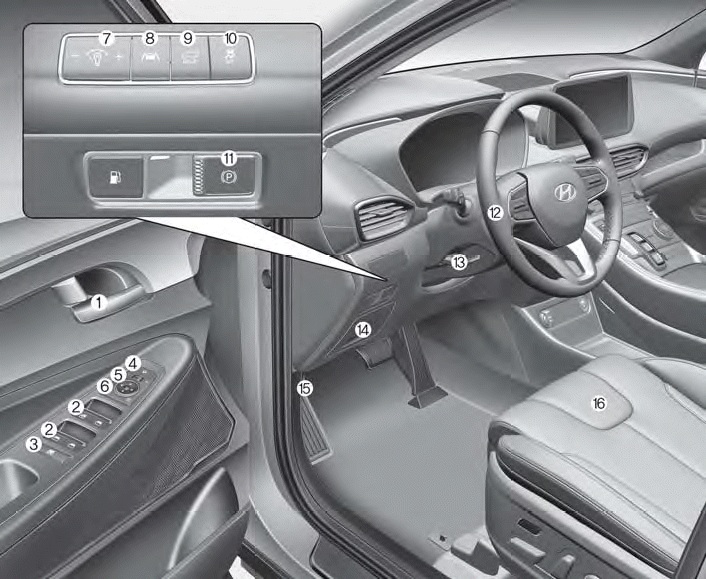Hyundai Santa Fe: Cooling System / Coolant. Repair procedures
| •
|
Never remove the reservoir tank cap when the engine is hot.
Serious scalding could be caused by hot fluid under high pressure
escaping from the radiator.
|
|
| •
|
Be careful not to damage the parts located under the vehicle
(floor under cover, fuel filter, fuel tank and canister) when
raising the vehicle using the lift.
(Refer to General Information - "Lift and Support Points")
|
|
| •
|
When pouring engine coolant, be sure to shut the relay box lid
and not to let coolant spill on the electrical parts or the
paint. If any coolant spills, rinse it off immediately.
|
|
|
1. |
Make sure the engine and radiator are cool to the touch.
|
|
2. |
Remove reservoir tank cap (A).

|
|
3. |
Loosen the drain plug (A), and drain the coolant.

|
|
4. |
Tighten the radiator drain plug securely.
|
|
5. |
After draining engine coolant in the reservoir tank, clean the tank.
|
|
6. |
Fill the radiator with water through the reservoir tank cap and tighten
the cap.
|
• |
To most effectively bleed the air, pour the water slowly
and press on the upper/lower radiator hoses.
|
|
|
|
7. |
Start the engine and allow to come to normal operating temperature.
Wait for the cooling fans to turn on several times. Accelerate the engine
to aid in purging trapped air. Shut engine off.
|
|
8. |
Wait until the engine is cool.
|
|
9. |
Repeat steps 1 to 8 until the drained water runs clear.
|
|
10. |
Fill fluid mixture with coolant and water(5:5) (Tropical region – 4:6)
slowly through the radiator cap. Push the upper/lower hoses of the radiator
so as bleed air easily.
|
• |
Use only genuine antifreeze/coolant.
|
|
• |
For best corrosion protection, the coolant concentration
must be maintained year-round at 35% minimum.
Coolant concentrations less than 35% may not provide
sufficient protection against corrosion or freezing.
|
|
• |
Coolant concentrations greater then 60% will impair
cooling efficiency and are not recommended.
|
|
|
• |
Do not mix different brands of antifreeze/coolants.
|
|
• |
Do not use additional rust inhibitors or antirust products;
they may not be compatible with the coolant.
|
|
|
|
11. |
Start the engine and run until coolant circulates.
When the cooling fan operates and coolant circulates, refill coolant
through the radiator cap.
|
|
12. |
Repeat 11 until the cooling fan 3-5 times and bleed air sufficiently
out of the cooling system.
|
|
13. |
Install the radiator cap and fill the reservoir tank to the "MAX (or
F)" line with coolant.
|
|
14. |
Run the vehicle under idle until the cooling fan operates 2-3 times.
|
|
15. |
Stop the engine and wait coolant gets cool.
|
|
16. |
Repeat 10 to 15 until the coolant level doesn't fall any more, bleed
air out of the cooling system.
|
• |
It takes time to bleed out all the air in the cooling
system. Refill coolant when coolant gets cool completely,
when recheck the coolant level in the reservoir tank
for 2-3 days after replacing coolant.
|
|
|
Coolant capacity
AT : 7.7 L (2.0 U.S.gal., 8.14 U.S.qt., 6.8 lmp.qt.)
|
|
Removal and Installation
•
Be careful not to damage the parts located under the vehicle
(floor under cover, fuel filter, fuel tank and canister) when
raising the vehicle using the lift...
Categories

1. Inside door handle
2. Power window switches
3. Power window lock button/Electronic child safety lock button
4. Side view mirror folding button
5. Side view mirror control switch
6. Central door lock switch
7. Instrument panel illumination control switch
read more
 Radiator. Repair procedures
Radiator. Repair procedures






